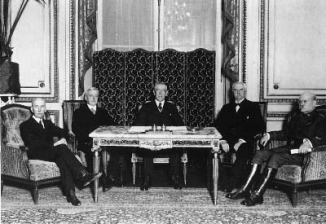Analysis of the Inter-War Period
Treaty of Versailles (1919)

The Treaty of Versailles was established on June 28, 1919 by the "Big Three" which were David Lloyd George, Georges Clemenceau, and Woodrow Wilson. After periods of argument on what the treaty should establish, it was concluded that Germany is to be blamed for World War I. It was believed that since Germany was the one responsible for World War I, it should then compensate for the deaths of people and also should pay up for what has been lost during the course of the war. By establishing this idea, Germany had become the only one at fault. This was unfair because every country involved had its own factors that dealt with war, not only Germany. Germany therefore had to pay reparations, as well as give all of the German coal to France, forcing Germany into economic depression and eventually, leading to the rise of Adolf Hitler, an important factor in the start of World War II.
Concepts Surrounding the Treaty of Versailles
It is important to keep in mind the concepts of: cooperation, internationalism, regional security, national security, global collective security, conflict, and total war.
How the Treaty of Versailles Contributed to the Start of World War Two
This treaty disallowed Germany to establish an army big enough to protect itself, as Germany was limited to 100 000 men serving the army without the usage of any tanks. 6 navy vessels were allowed without the use of any submarines, Germany was unable to have any air force, and also the Rhineland was to be free of German army and any weaponry. In other words, the Germans who had occupied the Rhine had been demilitarized permanently.
By having this treaty in place, 440 clauses were established and out of these clauses, the first 26 dealt with the League of Nations while the other 414 clauses blamed Germany for all of WWI. Much of the land formerly owned by Germany had been confiscated due to the treaty and split up amongst other European countries. Alsace-Lorraine was returned to France, North Schleswig given to Denmark, Eupen and Malmedy given back to Belgium, and Hultschin given to Czechoslovakia.
The Treaty of Versailles later left Germany in a bankruptcy situation due to the reparations and also the situation of where the coal mined must be exported to the Allies. The treaty allowed France to feel as if they had established peace, because it disabled Germany from taking over parts of France which had helped the establishment of the League of Nations, which had brought universal peace throughout Europe. Later on however, this led to Adolf Hitler's rise to power because Germany was in a debt situation and he "promised" that Germany would become a powerful country once again and that success would be reached in new ways which will lead the way out of bankruptcy. After Hitler's rise to power, he became an important factor in the start of World War II, by using German nationalism to slowly topple the Treaty of Versailles, starting to conquer Europe once again, which led to the rise of national Socialism in Germany (in other words, the NAZI movement).
Concepts Surrounding the Treaty of Versailles
It is important to keep in mind the concepts of: cooperation, internationalism, regional security, national security, global collective security, conflict, and total war.
How the Treaty of Versailles Contributed to the Start of World War Two
This treaty disallowed Germany to establish an army big enough to protect itself, as Germany was limited to 100 000 men serving the army without the usage of any tanks. 6 navy vessels were allowed without the use of any submarines, Germany was unable to have any air force, and also the Rhineland was to be free of German army and any weaponry. In other words, the Germans who had occupied the Rhine had been demilitarized permanently.
By having this treaty in place, 440 clauses were established and out of these clauses, the first 26 dealt with the League of Nations while the other 414 clauses blamed Germany for all of WWI. Much of the land formerly owned by Germany had been confiscated due to the treaty and split up amongst other European countries. Alsace-Lorraine was returned to France, North Schleswig given to Denmark, Eupen and Malmedy given back to Belgium, and Hultschin given to Czechoslovakia.
The Treaty of Versailles later left Germany in a bankruptcy situation due to the reparations and also the situation of where the coal mined must be exported to the Allies. The treaty allowed France to feel as if they had established peace, because it disabled Germany from taking over parts of France which had helped the establishment of the League of Nations, which had brought universal peace throughout Europe. Later on however, this led to Adolf Hitler's rise to power because Germany was in a debt situation and he "promised" that Germany would become a powerful country once again and that success would be reached in new ways which will lead the way out of bankruptcy. After Hitler's rise to power, he became an important factor in the start of World War II, by using German nationalism to slowly topple the Treaty of Versailles, starting to conquer Europe once again, which led to the rise of national Socialism in Germany (in other words, the NAZI movement).
